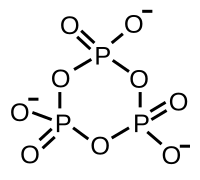Metaphosphate

Metaphosphate is a type of molecule that is made up of phosphorus and oxygen. You might know that phosphorus is a chemical element that is important for making things like bones and teeth - it's also used in some detergents and fertilizers! In metaphosphate, the phosphorus atoms are linked together in a long chain.
Think of it like a piece of spaghetti - the phosphorus atoms are like the pasta and the oxygen atoms (which are smaller) are like the sauce. When you cook spaghetti, you can either cook it all together or you can break it into smaller pieces. When you break it, it's easier to eat and it doesn't get tangled up in your fork as much. Metaphosphate works kind of the same way - it can be broken up into smaller pieces called polyphosphates, which are easier for your body to use.
Polyphosphates are used in things like food additives, where they help keep things like meat and seafood juicy and tender. They're also used in some laundry and dishwasher detergents - they help soften water and make it easier for the soap to clean your clothes or dishes.
So, in summary, metaphosphate is a molecule made up of phosphorus and oxygen that can be broken up into smaller pieces called polyphosphates. These are used in things like food additives and detergents.
Think of it like a piece of spaghetti - the phosphorus atoms are like the pasta and the oxygen atoms (which are smaller) are like the sauce. When you cook spaghetti, you can either cook it all together or you can break it into smaller pieces. When you break it, it's easier to eat and it doesn't get tangled up in your fork as much. Metaphosphate works kind of the same way - it can be broken up into smaller pieces called polyphosphates, which are easier for your body to use.
Polyphosphates are used in things like food additives, where they help keep things like meat and seafood juicy and tender. They're also used in some laundry and dishwasher detergents - they help soften water and make it easier for the soap to clean your clothes or dishes.
So, in summary, metaphosphate is a molecule made up of phosphorus and oxygen that can be broken up into smaller pieces called polyphosphates. These are used in things like food additives and detergents.
Related topics others have asked about:
